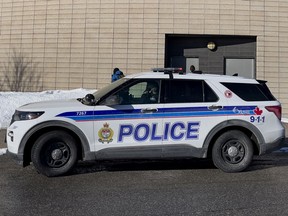Thibault and Stewart: Don't lose focus on alternative policing approaches in Ottawa
Politics aside, city council and the Ottawa Police Services Board must still confront the challenge of gradually shifting funds away from enforcement and towards services that strengthen community well-being.

Article content
In the complicated fray now surrounding policing in Ottawa, there’s no gain in speculating on motives in the ousting of Diane Deans as head of the Ottawa Police Services Board, or the departure of the remaining board members. What we do need to pay attention to is the fledgling mental health and addictions response by the Ottawa Police Services and their partners.
Modest but critically important steps to evolve the approach were recently taken by the police services board during the tenure of councillors Deans, Rawlson King, Carol Anne Meehan and vice-chair Sandy Smallwood, with the support of then-members Robert Swaita, Beverly Johnson and Daljit Nirman.
One step was the police service’s consultation on a Mental Health Response Strategy in January 2021. In November 2021, the board reduced the approved Ottawa police budget increase to two per cent instead of the proposed 2.86 per cent. That doesn’t sound big. But it amounts to $2.65 million that will go towards centrally dispatched, community-based crisis intervention teams for incidents related to mental health and addictions, as well as some additional investment in upstream action to reduce those incidents.
The reallocation decision was prompted in part by a report released last fall by Ottawa’s Community Health and Resource Centres. The report analyzed available Ottawa police incident/response data, yielding clear evidence that a large proportion of the police budget is spent on situations the police are not best trained or equipped to address: incidents that do not involve criminal or even dangerous behaviour. Many are interactions with people who are experiencing homelessness or are precariously housed, and with people who are racialized. The report also recommended more economically efficient and socially beneficial ways to address such incidents and the conditions that lead to them.
Why is it important to consider this issue now? Because dissatisfaction with the police response to the three-week downtown occupation is leading to a hardening of views at opposite ends of the spectrum. On the one side are calls to increase the size and power of the police force, and on the other, calls to defund the police. Neither respond to the situation at hand, or to the long-term well-being of our communities.
As this work moves forward, what matters is not simply that there are increased investments in social services to respond to community crises, but that these services be co-designed with communities that are affected. A key component of the plan Ottawa Council passed last year was that the community play a leadership role in change.
Council and the Ottawa Police Services Board need to apply themselves to the challenging balance of gradually shifting funds away from enforcement approaches and towards interventions and services that strengthen well-being and provide less costly and better-matched incident response capacity. Long after the convoy has “de-occupied” Ottawa, we will be living with the direction that the police services board takes on how the police approach community crises. Let’s ensure the police focus on the job they are mandated to do and at the same time invest in alternative community-based approaches to respond to crises by people who need appropriate support in our city.
Simone Thibault is the former executive director of Centretown Community Health Centre. Dick Stewart is former general manager of Community and Social Services for the City of Ottawa.






Postmedia is committed to maintaining a lively but civil forum for discussion. Please keep comments relevant and respectful. Comments may take up to an hour to appear on the site. You will receive an email if there is a reply to your comment, an update to a thread you follow or if a user you follow comments. Visit our Community Guidelines for more information.